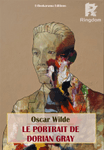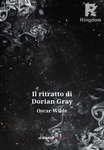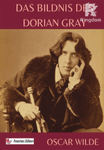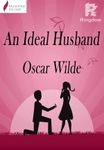ABOUT ME
ABOUT ME
 Oscar Wilde
Oscar Wilde
-
-2047STORY
-
2FOLLOWERS
-
1.695KVISITORS
STORY BY Oscar Wilde

Le Portrait de Dorian Gray
 Reads
Reads
"Le Portrait de Dorian Gray" est l"unique roman d"Oscar Wilde. Il le publie dans sa version définitive en 1891 . Cette œuvre hédoniste lui vaut une très grande notoriété, mais une partie du public anglais, sera choqué par l"immoralité du héros. Les nombreuses polémiques qui s"en suivront ne feront que renforcer le succès de Wilde.Ce roman fantastique est à la fois un manifeste esthétique et un récit moral. Bien qu"Oscar Wilde y développe l"idée d"un art dégagé de toute éthique, le jeune Dorian Gray va faire face à sa conscience morale à travers son portrait qui porte à sa place les traces de sa perversité et la décadence que le temps inflige aux esprits les plus purs.Dorian Gray est un jeune homme d"une très grande beauté. Son ami artiste peintre Basil Hallward est obsédé par cette dernière et en tire toute son inspiration. Sa fascination pour le jeune homme le mène à faire son portrait, qui se révèle être la plus belle œuvre qu"il ait jamais peinte, et qu"il ne souhaite pas exposer. Dorian va faire la connaissance de Lord Henry, dit Harry, un ami de Basil. Conscient de la fascination et de la perversion que ce dernier pourrait avoir pour son idéal de beauté, « cette nature simple et belle », Basil demande à Lord Henry de ne pas tenter de le corrompre. Mais Dorian se laisse séduire par les théories sur la jeunesse et le plaisir de ce nouvel ami...
Updated at

Das Bildnis des Dorian Gray
 Reads
Reads
Das Bildnis des Dorian Gray von Oscar Wilde (Originaltitel: The Picture of Dorian Gray) ist der einzige Roman des irischen Schriftstellers Oscar Wilde. Eine erste Fassung erschien 1890 in Lippincott’s Monthly Magazine aus Philadelphia, 1891 wurde bei dem Londoner Verlag Ward, Lock and Co. die heute bekannte, überarbeitete und erweiterte Fassung in Buchform veröffentlicht. Der seinerzeit als anrüchig geltende Roman war auch Gegenstand des Unzuchtprozesses gegen Wilde.Die Hauptfigur, der reiche und schöne Dorian Gray, besitzt ein Porträt, das statt seiner altert und in das sich die Spuren seiner Sünden einschreiben. Während Gray immer maßloser und grausamer wird, bleibt sein Äußeres dennoch jung und makellos schön.Der Roman gilt als Oscar Wildes Prosahauptwerk. Themen sind die Moralität von Sinnlichkeit und Hedonismus im Viktorianismus und die Dekadenz der englischen Oberschicht. Außerdem lassen sich die Handlung und die eingearbeiteten Kunstbemerkungen sowohl als Proklamation wie auch als Kritik des Ästhetizismus lesen, einer literarischen Strömung des Fin de Siècle.
Updated at

Il ritratto di Dorian Gray
 Reads
Reads
Pochi classici sanno essere attuali e coinvolgenti quanto Il ritratto di Dorian Gray. Il celebre romanzo, opera di Oscar Wilde, narra le vicissitudini di Dorian, dandy e frequentatore dei migliori salotti di Londra, e dell"irrefrenabile culto della bellezza che lo porterà a stringere un patto diabolico... Ritratto della nostra epoca devota al culto dell"immagine, Dorian Gray riesce ad affascinare a distanza di secoli, influenzando generazioni di lettori, il teatro e la cinematografia.
Updated at

Das Bildnis des Dorian Gray
 Reads
Reads
Das Bildnis des Dorian Gray (Originaltitel: The Picture of Dorian Gray) ist der einzige Roman des irischen Schriftstellers Oscar Wilde. Eine erste Fassung erschien 1890 in Lippincott’s Monthly Magazine aus Philadelphia, 1891 wurde bei dem Londoner Verlag Ward, Lock and Co. die heute bekannte, überarbeitete und erweiterte Fassung in Buchform veröffentlicht. Der seinerzeit als anrüchig geltende Roman war auch Gegenstand des Unzuchtprozesses gegen Wilde.Die Hauptfigur, der reiche und schöne Dorian Gray, besitzt ein Porträt, das statt seiner altert und in das sich die Spuren seiner Sünden einschreiben. Während Gray immer maßloser und grausamer wird, bleibt sein Äußeres dennoch jung und makellos schön.Der Roman gilt als Oscar Wildes Prosahauptwerk. Themen sind die Moralität von Sinnlichkeit und Hedonismus im Viktorianismus und die Dekadenz der englischen Oberschicht. Außerdem lassen sich die Handlung und die eingearbeiteten Kunstbemerkungen sowohl als Proklamation wie auch als Kritik des Ästhetizismus lesen, einer literarischen Strömung des Fin de Siècle.Oscar Fingal O’Flahertie Wills Wilde (* 16. Oktober 1854 in Dublin; † 30. November 1900 in Paris) war ein irischer Schriftsteller, der sich nach Schulzeit und Studium in Dublin und Oxford in London niederließ. Als Lyriker, Romanautor, Dramatiker und Kritiker wurde er zu einem der bekanntesten und gleichzeitig umstrittensten Schriftsteller im viktorianischen Großbritannien.Wegen homosexueller „Unzucht“ wurde er 1895 zu zwei Jahren Zuchthaus mit harter Zwangsarbeit verurteilt; sie ruinierten seine Gesundheit. Nach der Entlassung lebte er verarmt in Paris, wo er im Alter von 46 Jahren starb.Übersetzer:Richard Zoozmann
Updated at

A House of Pomegranates
 Reads
Reads
A House of Pomegranates is a collection of fairy tales, written by Oscar Wilde, that was published in 1891 as a second collection for The Happy Prince and Other Tales (1888). Wilde once said that this collection was "intended neither for the British child nor the British public."The stories included in this collection are as follows:The Young KingThe Birthday of the InfantaThe Fisherman and his SoulThe Star-ChildTHE YOUNG KING (excerpt)It was the night before the day fixed for his coronation, and the young King was sitting alone in his beautiful chamber. His courtiers had all taken their leave of him, bowing their heads to the ground, according to the ceremonious usage of the day, and had retired to the Great Hall of the Palace, to receive a few last lessons from the Professor of Etiquette; there being some of them who had still quite natural manners, which in a courtier is, I need hardly say, a very grave offence.The lad - for he was only a lad, being but sixteen years of age - was not sorry at their departure, and had flung himself back with a deep sigh of relief on the soft cushions of his embroidered couch, lying there, wild-eyed and open-mouthed, like a brown woodland Faun, or some young animal of the forest newly snared by the hunters.And, indeed, it was the hunters who had found him, coming upon him almost by chance as, bare-limbed and pipe in hand, he was following the flock of the poor goatherd who had brought him up, and whose son he had always fancied himself to be. The child of the old King’s only daughter by a secret marriage with one much beneath her in station - a stranger, some said, who, by the wonderful magic of his lute-playing, had made the young Princess love him; while others spoke of an artist from Rimini, to whom the Princess had shown much, perhaps too much honour, and who had suddenly disappeared from the city, leaving his work in the Cathedral unfinished - he had been, when but a week old, stolen away from his mother’s side, as she slept, and given into the charge of a common peasant and his wife, who were without children of their own, and lived in a remote part of the forest, more than a day’s ride from the town. Grief, or the plague, as the court physician stated, or, as some suggested, a swift Italian poison administered in a cup of spiced wine, slew, within an hour of her wakening, the white girl who had given him birth, and as the trusty messenger who bare the child across his saddle-bow stooped from his weary horse and knocked at the rude door of the goatherd’s hut, the body of the Princess was being lowered into an open grave that had been dug in a deserted churchyard, beyond the city gates, a grave where it was said that another body was also lying, that of a young man of marvellous and foreign beauty, whose hands were tied behind him with a knotted cord, and whose breast was stabbed with many red wounds...Oscar Fingal O'Flahertie Wills Wilde (16 October 1854 – 30 November 1900) was an Irish playwright, novelist, essayist, and poet. After writing in different forms throughout the 1880s, he became one of London's most popular playwrights in the early 1890s. He is remembered for his epigrams, his novel The Picture of Dorian Gray, his plays, as well as the circumstances of his imprisonment and early death.Wilde's parents were successful Anglo-Irish, Dublin intellectuals. Their son became fluent in French and German early in life. At university, Wilde read Greats; he proved himself to be an outstanding classicist, first at Dublin, then at Oxford. He became known for his involvement in the rising philosophy of aestheticism, led by two of his tutors, Walter Pater and John Ruskin. After university, Wilde moved to London into fashionable cultural and social circles.As a spokesman for aestheticism, he tried his hand at various literary activities: he published a book of poems, lectured in the United States and Canada on the new "English Renaissance in Art", and then returned to London where he worked prolifically as a journalist. Known for his biting wit, flamboyant dress and glittering conversation, Wilde became one of the best-known personalities of his day.At the turn of the 1890s, he refined his ideas about the supremacy of art in a series of dialogues and essays, and incorporated themes of decadence, duplicity, and beauty into his only novel, The Picture of Dorian Gray (1890). The opportunity to construct aesthetic details precisely, and combine them with larger social themes, drew Wilde to write drama. He wrote Salome (1891) in French in Paris but it was refused a licence for England due to the absolute prohibition of Biblical subjects on the English stage. Unperturbed, Wilde produced four society comedies in the early 1890s, which made him one of the most successful playwrights of late Victorian London.
Updated at

Das Bildnis des Dorian Gray
 Reads
Reads
Die Hauptfigur, der reiche und schöne Dorian Gray, besitzt ein Porträt, das statt seiner altert und in das sich die Spuren seiner Sünden einschreiben. Während Gray immer maßloser und grausamer wird, bleibt sein Äußeres dennoch jung und makellos schön.
Updated at

Il ritratto di Dorian Gray
 Reads
Reads
SOLIDARIETA" DIGITALE : tutto il nostro catalogo in promozione! Dorian Gray è un giovane di straordinaria bellezza. Un giorno viene ritratto da un suo amico pittore, Basil Hallward, in un quadro che ne rappresenta fedelmente le stupende fattezze. Proprio nello studio del pittore, Dorian conosce lord Henry Wotton, uomo cinico e senza scrupoli che diventa ben presto un punto di riferimento nella vita del ragazzo. Dorian inizia così a condurre anch’egli un’esistenza fatta di eccessi e priva di ogni scrupolo morale. Nonostante le azioni malvagie di cui Dorian si rende colpevole, tra le quali l’uccisione dell’amico Basil, e nonostante il trascorrere del tempo, il suo volto non accenna a perdere la bellezza che lo caratterizza, come fosse inattaccabile sia dai segni del tempo che da quelli della depravazione. È piuttosto il suo ritratto a mostrare il peso di tutto questo. Il ritratto di Dorian infatti, divenuto mostruoso, non è che la raffigurazione della sua anima perduta. Questa gli si mostra in tutto il suo orrore e Dorian, non sopportandone il peso, sfregia il ritratto con un pugnale, lo stesso usato per uccidere Basil. All’improvviso quel volto dipinto riacquista l’originaria bellezza, quella che tutti fino a quell’istante avevano ammirato sul volto di Dorian, dove ora appaiono invece i segni della dissolutezza e della sua vita corrotta e degradata.
Updated at

Il ritratto di Dorian Gray
 Reads
Reads
“Il ritratto di Dorian Gray” è considerato una delle ultime opere classiche del romanzo di stampo gotico e horror, nonché uno dei grandi classici moderni della letteratura occidentale. La storia narra di un giovane uomo dal fascino irresistibile che vende la propria anima per la giovinezza e la bellezza eterna. In parallelo con la sua discesa nella lussuria, il suo aspetta resta immacolato e incorrotto, mentre il suo ritratto invecchia e degenera a vista d’occhio, accumulando su di sé il peso degli anni e della corruzione morale. Al suo primo apparire, nel 1890, il racconto della depravazione di Dorian Gray destò scandalo nell’Inghilterra vittoriana e qualche anno dopo fu citato in processo come prova delle tendenze omosessuali di Wilde, causandone l’imprigionamento e il conseguente declino. Sublime e affascinante, “Il ritratto di Dorian Gray” esplora i legami tra bellezza, decadenza e ambiguità e costituisce una tappa obbligata che lascerà un segno indelebile nei lettori di tutte le età. La presente edizione è arricchita da un articolo su Wilde del grande scrittore irlandese James Joyce. Di Oscar Wilde nelle edizioni Nemo Editrice: “Salomé”, versione bilingue italiano/francese, nella traduzione di Carmen Margherita Di Giglio, con illustrazioni di Aubrey Beardsley.
Updated at

An ideal husband
 Reads
Reads
An Ideal Husband is an 1895 stage play by Oscar Wilde that revolves around blackmail and political corruption, and touches on the themes of public and private honour. The action is set in London, in "the present", and takes place over the course of twenty-four hours. Oscar Fingal O"Flahertie Wills Wilde (16 October 1854 – 30 November 1900) was an Irish poet and playwright. After writing in different forms throughout the 1880s, he became one of London"s most popular playwrights in the early 1890s. He is best remembered for his epigrams and plays, his novel The Picture of Dorian Gray, and the circumstances of his criminal conviction for "gross indecency", imprisonment, and early death at age 46.
Updated at

